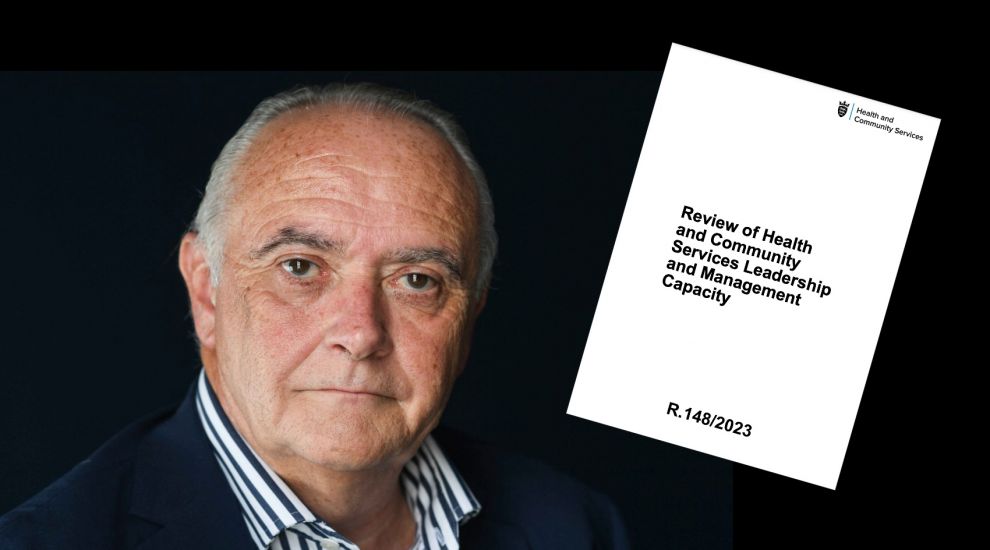


After it emerged earlier this year that the annual bill for managers in Health now stands at more than £10m, the department's Chief Officer has aimed to put an end to suggestions that there are "too many" once and for all – by publishing a new report suggesting that the opposite is true.
The report was authored by Chris Bown, who took up a 12-month contract as the department's most senior leader in April.
According to Mr Bown's report, too little management is “a significant barrier” to turning around the Health and Community Services Department.
He said that current management staffing in Health is "less than you would expect to see in the delivery of a major healthcare transformation programme".
He added that this was identified as a potential block to progress by the 'Change Team' recruited to drive improvements in Health at a cost of £200,000 per quarter.
CLICK TO READ: Mr Bown's Review of Health and Community Services Leadership and Management Capacity.
Mr Bown – who was brought in to lead the 'Change Team' before taking over the top job after Caroline Landon's shock departure – says that reaching the “standard of the best in healthcare providers” will take a number of years and require additional management resources.
“This report concludes that the department is not over-managed in terms of the numbers,” Mr Bown states, observing that the 45 management staff who account for 1.7% of the department’s workforce compare with a 9.5% ratio in the UK workforce.
The Interim Chief Officer acknowledges a public perception that managers “are largely irrelevant for the delivery of healthcare” and that spending money on managers is viewed as “wasteful”.
In March, a response to a request under the Freedom of Information Law showed that “management staffing” within Health and Community Services accounted for nearly 6% of the Department’s annual budget.
The annual bill for managers now stands at £10.1m, having shot up by more than £3.5m since 2019.
CLICK TO ENLARGE: HCS management staffing budget, 2019-2023.
Reacting to the new management spending figures, Peter Funk, of the Friends of Our New Hospital Group, criticised what he described as an "exponential" rise in healthcare managers.
Another member of Friends of Our New Hospital Group, Brigadier Bruce Willing, described the amount of money being spend on management in HCS as “ludicrous”.
“The whole management system is constipated,” said Mr Willing. “They’re like hamsters spinning in their wheels.”
He also claimed that the “ridiculous” number of managers “causes real difficulties on the ward floor”, sharing concerns that frontline healthcare staff often have to spend more time doing paperwork than dealing with patients.
"It gets in the way of everything," he said.
Calling for an audit of HCS management, Mr Willing described the current system as “ineffective and unaffordable”.
He said the money spent on “farcical” management staffing would be better used to pay nurses, invest in better medical equipment, and to design the new hospital.
He said: “Bad management causes a waste of both time and money, and gets in the way of everything.
"A lean organisation focuses on delivery, not bureaucracy."
While emphasising a commitment to identifying management/administration cost savings as part of the department’s financial recovery plan, Mr Bown nonetheless expressed concern that too few resources are currently being devoted to management.
“In my time as Chief Officer, I have met with clinical staff who believe that the department has too many managers but also many who are looking for more management support. The truth is that we need the capacity and capability to deliver what the Government of Jersey requires of its health services,” he wrote.

Pictured: Chris Bown was appointed as Interim Chief Officer of Health following the shock departure of Caroline Landon.
Mr Bown's recent report "does not consider leadership/management capability" but acknowledges that the "low levels of recorded objectives and appraisals is a cause for concern and needs to improve".
He explains that Health senior leaders "must hold individuals to account for delivery and where required, support their training and development, to ensure that we have the effective leadership and management of the Department".
The Interim Chief Officer also notes that the absence of dedicated management in areas like finance, HR and digital services – functions provided centrally by corporate services – is regarded as a shortcoming.
“The Chief Officer, turnaround team and senior leadership team consider this a weakness for the department and are of the view that consideration should be given to changing this arrangement,” he writes.
Mr Bown’s analysis found that the department has a total five executive directors, including a part-time Medical Director, 17 general management roles and 23 specialist managers.
The cost of these non-clinical leadership/management roles is 2% of the total HCS budget – some £5,113,000 of the total budget of £255,560,000, equating to an average package of £113,622 for the 45 staff.
Last year, the total cost for HCS salaries was £169,429,000.
Comments
Comments on this story express the views of the commentator only, not Bailiwick Publishing. We are unable to guarantee the accuracy of any of those comments.